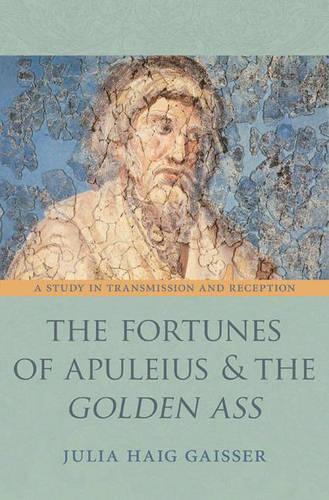
The Fortunes of Apuleius and the Golden Ass: A Study in Transmission and Reception
(Hardback)
Publishing Details
The Fortunes of Apuleius and the Golden Ass: A Study in Transmission and Reception
By (Author) Julia Haig Gaisser
Princeton University Press
Princeton University Press
1st April 2008
United States
Classifications
Professional and Scholarly
Non Fiction
873.009
Winner of American Philological Association: C.J. Goodwin Award of Merit 2009
Physical Properties
Hardback
408
Width 152mm, Height 235mm
680g
Description
This book traces the transmission and reception of one of the most influential novels in Western literature. The Golden Ass, the only ancient Roman novel to survive in its entirety, tells of a young man changed into an ass by magic and his bawdy adventures and narrow escapes before the goddess Isis changes him back again. Its centerpiece is the famous story of Cupid and Psyche. Julia Gaisser follows Apuleius' racy tale from antiquity through the sixteenth century, tracing its journey from roll to codex in fourth-century Rome, into the medieval library of Monte Cassino, into the hands of Italian humanists, into print, and, finally, over the Alps and into translation in Spanish, French, German, and English. She demonstrates that the novel's reception was linked with Apuleius' reputation as a philosopher and the persona he projected in his works. She relates Apuleius and the Golden Ass to a diverse cast of important literary and historical figures--including Augustine, Fulgentius, Petrarch, Boccaccio, Bessarion, Boiardo, and Beroaldo. Paying equal attention to the novel's transmission (how it survived) and its reception (how it was interpreted), she places the work in its many different historical contexts, examining its representation in art, literary imitation, allegory, scholarly commentary, and translation. The volume contains several appendixes, including an annotated list of the manuscripts of the Golden Ass. This book is based on the author's Martin Classical Lectures at Oberlin College in 2000.
Reviews
Winner of the 2009 Charles J. Goodwin Award of Merit, American Philological Association "With a graceful style and an immense knowledge of the vicissitudes of the story, Gaisser traces the manuscripts that carried The Golden Ass through the Middle Ages and into the Renaissance; the editions and translations that followed; and the ways in which readers interpreted, imitated, and adapted it. The result is a remarkable work of scholarship: detailed and learned, but accessible to the general reader with an interest in the fate of a brilliant book over the course of two millennia."--D. Konstan, Brown University, for CHOICE "Gaisser has done all students of Apuleius a profound service in a book that is not only a model for reception studies but will also be a standard reference in Apuleian studies for at least a generation."--Joel C. Relihan, New England Classical Journal "This valuable book provides a fascinating perspective for comparativists on the nature of early modern exegesis. More importantly, it offers an invigorating re-evaluation of an enigmatic author whom many Latinists see only in the context of the time in which he lived--a context which has been constructed and constrained by the myopias of early-twentieth-century classical scholarship."--Andrew Laird, European Legacy
Author Bio
Julia Haig Gaisser is Eugenia Chase Guild Professor Emeritus in the Humanities at Bryn Mawr College. She is the author of "Catullus, Catullus in English, Pierio Valeriano on the Ill Fortune of Learned Men", and "Catullus and His Renaissance Readers".
